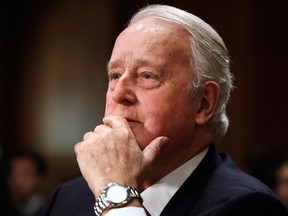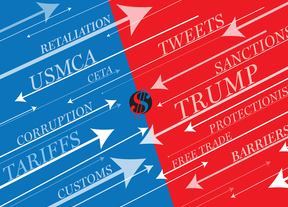Former Prime Minister Brian Mulroney on Pipeline Crisis
Former Prime Minister Brian Mulroney recently addressed the crisis in oil pipeline capacity, criticizing Ottawa for abdicating its leadership role in addressing this issue. Speaking at a Toronto investment conference, Mulroney emphasized that his own approach would involve making First Nations, environmental groups, and provincial premiers stakeholders in a project to construct pipelines running east, west, and south.
Mulroney’s Strategy
Mulroney stressed the importance of involving various stakeholders in addressing the pipeline crisis. He acknowledged that such groups may refuse to support his plan but stated that he would proceed with caution, allowing Canadians to decide whether they support him or not. In a nod to his own experiences as Prime Minister, Mulroney cited the successful implementation of the U.S.-Canada Free Trade Agreement (FTA) in 1988 as an example of how leadership can drive economic growth.
FTA Success Story
Mulroney recalled that critics of the FTA went to "bizarre lengths" during the 1988 federal election, warning Canadians that free trade would lead to disastrous consequences. However, Mulroney pointed out that trade volumes have more than tripled since then, from $235 billion in 1989 to $881 billion today. He also noted that the U.S. has benefited significantly from this deal.
Comparing Past and Present
In comparing his own experiences with the current pipeline crisis, Mulroney praised the new U.S.-Mexico-Canada Agreement (USMCA) for modernizing NAFTA while maintaining essential provisions such as Chapter 19 dispute settlement mechanisms and rules of origin in the automotive sector. However, he warned that the pact faces significant challenges, particularly in the United States where it requires ratification by Congress.
Global Trade Developments
The recent G20 Summit saw China and the U.S. agree on a 90-day trade truce following talks between Trump and Chinese President Xi Jinping. Mulroney expressed caution about these developments, stating that the U.S.-China talks would be "very complicated and very tough."
Implications for Canada
In light of these global trade developments, Mulroney’s comments hold significant implications for Canada. His emphasis on stakeholder engagement and leadership in addressing pipeline issues resonates with many Canadians who are concerned about the economic and environmental impacts of this crisis.
Mulroney’s Legacy and Current Challenges
As a former Prime Minister, Mulroney’s legacy continues to shape Canadian politics and trade policies. While his current comments reflect his continued commitment to free trade and market-driven solutions, they also highlight ongoing challenges facing Ottawa in addressing pressing issues such as pipeline capacity.
Conclusion
Former Prime Minister Brian Mulroney’s recent comments on the pipeline crisis underscore the need for leadership and stakeholder engagement in addressing this complex issue. As Canada navigates its own trade relationships with major partners like the U.S. and Mexico, it is essential to draw lessons from past experiences while adapting to new challenges.



